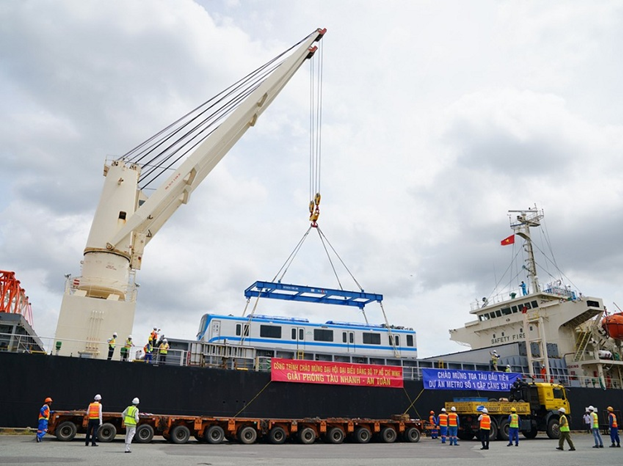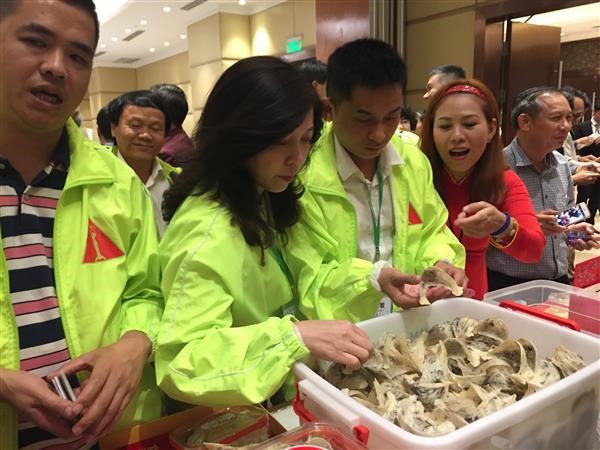 Economy
Economy

Demand for bird’s nests in China is increasing, offering opportunities for Vietnamese firms, but new measures are needed to enable producers to export the product directly to China, rather than carrying it over the border, according to the Ministry of Agricultural and Rural Development.
 |
| Leaders of Chinese firms look at bird’s nest products displayed on the sidelines of the forum on enhancing co-operation to boost the development of Vietnamese bird’s nest industry in HCM City. — Photo baohaiquan.vn |
HCM CITY — Demand for bird’s nests in China is increasing, offering opportunities for Vietnamese firms, but new measures are needed to enable producers to export the product directly to China, rather than carrying it over the border, according to the Ministry of Agricultural and Rural Development.
Speaking at a HCM City forum about the bird nest sector last Friday, Deputy Minister Phùng Đức Tiến said the swift-bird breeding industry had been developing rapidly in the country, mostly in the south, but unofficial trade resulted in low value and profits.
More than 5,000 structures had been built to breed the birds in 36 provinces and cities, producing around 50 tonnes of nests a year.
But exports to China accounted for only 8 per cent via unofficial cross-border trade, he said.
Zhang Yaqin, president of Guangdong Bird’s Nest Industry Association, said China was the largest import market for edible bird’s nest.
Official imports of bird’s nests that have received certificates from the Chinese Academy of Inspection and Quarantine (CAIQ) went up from 81 tonnes in 2017 to 84 tonnes in the first 10 months of last year.
Luo Yining, vice chairman of China’s Medical Pharmaceutical Materials Association, and president of Southeast Yandu (Xiamen) Industrial Development Co., Ltd., said China in 2011 banned imports of bird’s nests of unclear origin because of a scandal involving the sale of fake bird’s nests.
In 2015, China lifted the ban, replacing it with strict rules aimed at improving safety and traceability.
Currently, Malaysia, Indonesia and Thailand have all completed legal procedures to export bird’s nests into China.
But Việt Nam still cannot export officially into China because of several reasons, including the lack of regulations on management and development of the bird’s nest industry, quality standards for the product, and export standards, according to Luo. Vietnamese bird’s nests are considered to have very good quality and suited for direct import to China.
But China currently applies very strict regulations on importing bird’s nests, especially unprocessed bird’s nest, including regulations that the import must go through ports with adequate equipment, and must be preliminary processed at enterprises designated by the General Administration of Customs of China.
He said his company, which specialises in processing raw bird’s nests and was appointed by the General Administration of Customs, wanted to cooperate with Vietnamese firms in conducting quarantine bird’s nest before export to China.
Tiến stressed that his ministry would support the development of the bird nest industry and co-operation with China to directly export bird’s nests to the market.
The recently adopted Law on Animal Husbandry includes a provision on the management of the bird’s nest industry, an important foundation for the industry to meet the requirements to export to China and other markets in the coming time, he said.
At the forum, the Việt Nam Farms and Agricultural Enterprises Association and Yến Quân Company signed strategic cooperation agreements with China’s Medical Pharmaceutical Materials Association and Southeast Yandu to promote direct exports of Vietnamese bird’s nests to China.
Organised by the Vietnamese Bird’s Nest Farms Association, the forum saw the participation of leaders of 10 Chinese companies and 30 Vietnamese bird’s nest farms. — VNS




